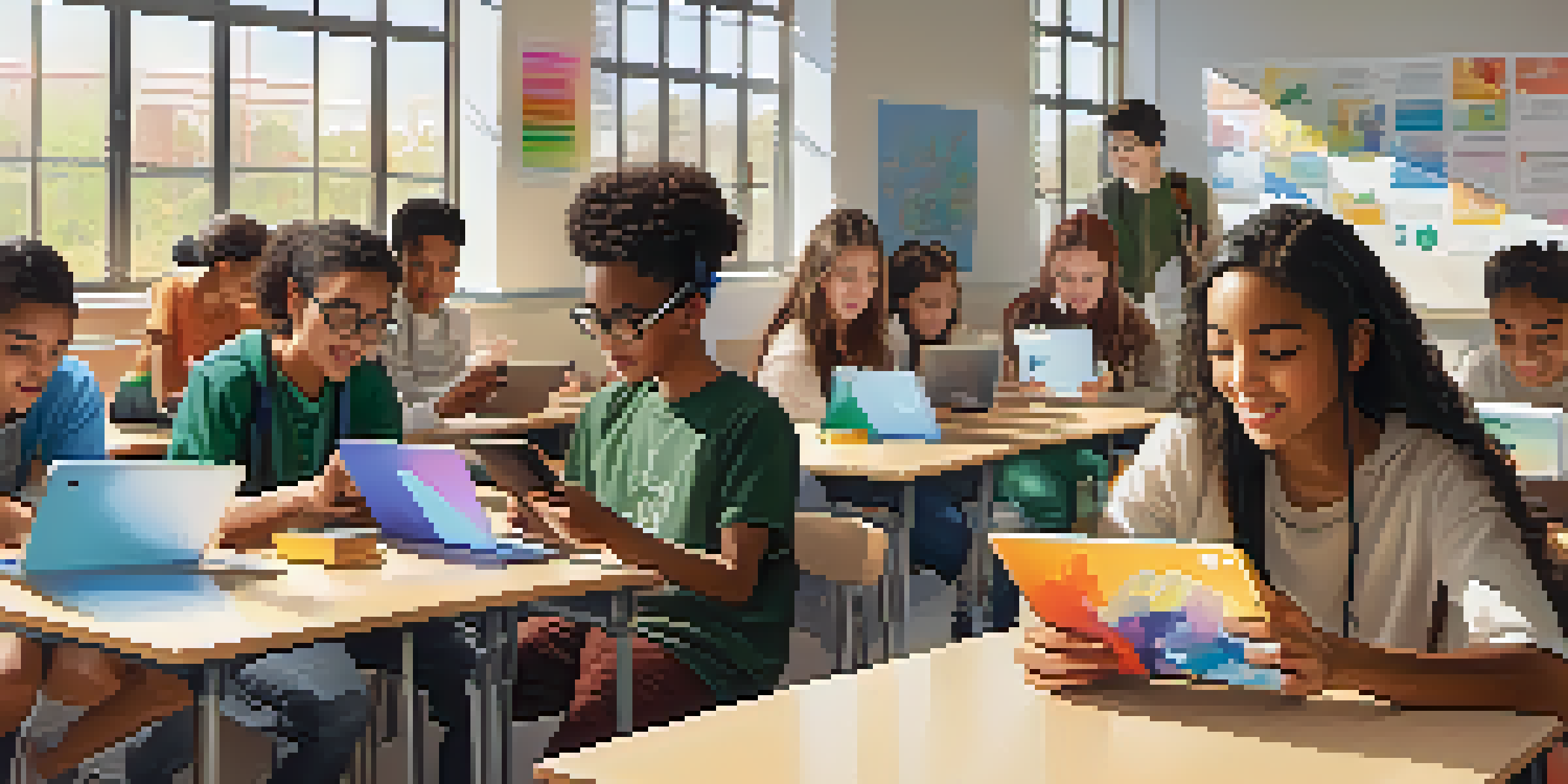The Role of Mobile Technology in Global Education Initiatives

Introduction to Mobile Technology in Education
Mobile technology has revolutionized the way we access information and learn. With smartphones and tablets becoming ubiquitous, education is no longer confined to traditional classrooms. This shift allows learners from diverse backgrounds to engage with educational content anytime and anywhere, fostering a more inclusive learning environment.
Mobile technology has the potential to change the way we learn and how we teach, making education more accessible and personalized.
As we delve deeper into this topic, it's essential to recognize the various forms of mobile technology, such as apps, e-books, and online platforms, that cater to different learning styles. These tools empower students to take charge of their education, making learning more accessible and personalized. Moreover, mobile technology can bridge gaps in resources, especially in underserved communities.
Ultimately, understanding the role of mobile technology in education sets the stage for exploring its broader implications and transformative potential across global initiatives.
Enhancing Accessibility to Education
One of the most significant benefits of mobile technology is its ability to enhance accessibility to education. Students in remote areas can access quality educational resources through their mobile devices, breaking down geographical barriers. This democratization of knowledge empowers learners who might otherwise be excluded from traditional education systems.

For instance, mobile applications that offer lessons in multiple languages enable non-native speakers to learn at their own pace. Additionally, many online platforms provide free or low-cost courses, making quality education available to those who may not have the financial means to attend formal institutions. This accessibility is crucial in promoting equality in education.
Mobile Tech Enhances Education Access
Mobile technology breaks down geographical barriers, allowing students from remote areas to access quality educational resources and promoting equality in education.
As mobile technology continues to evolve, its potential to make education more inclusive and accessible will only grow, paving the way for future innovations that prioritize learning for all.
Engaging Learning Experiences Through Mobile Apps
Mobile apps have transformed the way students engage with educational content. Interactive learning experiences, such as gamified lessons and virtual simulations, capture students' attention and enhance retention. This modern approach makes learning more enjoyable and motivates students to explore subjects in depth.
Education is the most powerful weapon which you can use to change the world.
Consider language learning apps like Duolingo, which utilize game mechanics to encourage daily practice and progress tracking. Such tools not only make learning fun but also foster a sense of accomplishment as students achieve their goals. This kind of engagement is especially beneficial for younger learners who may struggle with traditional teaching methods.
By integrating mobile technology into the educational landscape, we create dynamic learning environments that cater to students' interests and needs, ultimately leading to better educational outcomes.
Supporting Teachers with Mobile Technology
Mobile technology doesn't just benefit students; it also supports teachers in numerous ways. Educators can use mobile devices to access professional development resources, collaborate with peers, and enhance their teaching strategies. This access to information fosters a culture of continuous improvement among educators.
For example, teachers can utilize apps that facilitate lesson planning, classroom management, and communication with students and parents. These tools simplify administrative tasks, allowing educators to focus more on teaching and less on paperwork. Furthermore, mobile technology enables teachers to provide real-time feedback, enhancing the learning experience for students.
Engaging Learning Through Apps
Interactive mobile apps, like gamified lessons, make learning enjoyable and motivate students to engage deeply with educational content.
As we empower educators with mobile technology, we ultimately strengthen the entire educational ecosystem, leading to more effective teaching and learning.
Challenges and Limitations of Mobile Technology in Education
While mobile technology presents numerous advantages, it also comes with challenges and limitations. Access to devices and reliable internet connectivity remains a significant hurdle for many students, particularly in developing countries. This digital divide can exacerbate existing inequalities in education.
Additionally, the overreliance on mobile technology can lead to distractions, making it essential for educators and parents to guide students in using these tools effectively. Striking a balance between technology and traditional learning methods is crucial for fostering well-rounded educational experiences. Without proper guidance, students may miss out on the benefits of face-to-face interactions and hands-on learning.
Addressing these challenges requires collaborative efforts from governments, educational institutions, and communities to ensure that mobile technology is used effectively and equitably in education.
The Global Impact of Mobile Technology on Education Initiatives
Globally, mobile technology has catalyzed various education initiatives that aim to improve learning outcomes. Organizations like UNESCO and the World Bank have embraced mobile solutions to address educational disparities and promote lifelong learning. These initiatives often focus on harnessing mobile technology to provide resources, training, and support to educators and students alike.
For instance, mobile-based programs have been implemented in countries facing educational challenges, such as low literacy rates and teacher shortages. These programs leverage local knowledge and technology to create tailored solutions that resonate with the community's needs, ensuring that education is relevant and impactful.
Challenges of Mobile Learning
Despite its benefits, mobile technology poses challenges such as the digital divide and potential distractions, necessitating balanced and guided use.
As we observe these global initiatives, it becomes clear that mobile technology is not just a tool; it is a powerful agent of change that can transform education systems worldwide.
Future Trends in Mobile Technology and Education
Looking ahead, the future of mobile technology in education is both exciting and promising. Innovations like augmented reality (AR) and artificial intelligence (AI) are poised to enhance learning experiences even further. These technologies can provide immersive educational opportunities that engage students in ways previously unimaginable.
For example, AR can bring historical events to life, allowing students to explore ancient civilizations interactively. Similarly, AI-driven personalized learning platforms can adapt to individual students' needs, ensuring that everyone receives the support they require to succeed. Such advancements hold the potential to revolutionize education, making it more effective and engaging.

As we embrace these future trends, it’s essential to remain mindful of the ethical considerations and inclusivity, ensuring that all students benefit from these technological advancements.
Conclusion: Mobile Technology as a Catalyst for Educational Change
In conclusion, mobile technology plays a pivotal role in shaping the future of global education initiatives. From enhancing accessibility to providing engaging learning experiences, its impact is profound and far-reaching. By embracing the potential of mobile technology, we can foster a more inclusive and effective educational landscape for all.
However, it's crucial to address the challenges that accompany this technological shift, ensuring that no student is left behind. Collaboration among educators, policymakers, and communities is essential in navigating this evolving landscape and harnessing the full power of mobile technology.
As we move forward, let us continue to advocate for innovative solutions that prioritize equity and access in education, ultimately empowering learners around the world.